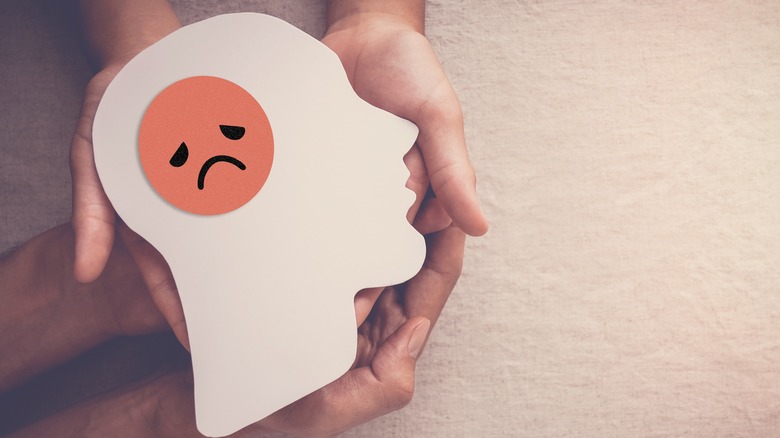The Effect Monkeypox Has On Your Brain
Monkeypox is a virus similar to smallpox which was eradicated in 1980, according to the Centers for Disease Control and Prevention (CDC). However, it's less severe than smallpox on average. It is found primarily in central and west Africa, but has occurred in other populations, explains the World Health Organization.
Transmitting monkeypox from one person to another typically requires prolonged face-to-face contact, or direct contact with the rash, scabs, or fluids of a person with monkeypox, explains the CDC. This can occur during intimate contact.
It's possible for monkeypox to spread from animals to humans, but that would typically require direct contact with the fluids or rash of an infected animal, being scratched or bitten, or consuming the meat of an animal that is infected, explains Mayo Clinic. However, don't believe the myth that monkeypox came from monkeys.
So it's clear that monkeypox typically requires direct or prolonged contact to transmit. However, this doesn't mean that the symptoms shouldn't be taken seriously, especially when it comes to the brain.
Monkeypox may lead to neurological complications
Monkeypox can cause numerous symptoms you should be aware of, such as fever, chills, muscle aches, respiratory symptoms and, most famously, a rash that can be anywhere on your body, explains the CDC. For most people, this will be the extent of the illness, with the rash starting 1 to 4 days after other symptoms begin, if there are other symptoms. However, recent research may have added another symptom to that list: neurological issues.
A new study in eClinicalMedicine has shown that in rare circumstances, the Monkeypox virus can affect someone's brain. Researchers looked at 19 studies that examined over 1,500 people from the United States, United Kingdom, Nigeria, and other African countries.
It was determined that neurological complications, like seizures, confusion, and brain inflammation, occurred in some people with the virus. Specifically, 2.7% of those infected had at least one seizure, 2.4% experienced confusion, and 2.0% experienced encephalitis, a type of brain inflammation. There was also some evidence that anxiety and depression occurred in some people with Monkeypox, although this was less clear.
Despite the findings, the researchers stressed caution. More research is needed, and it seems that most people with Monkeypox will not experience these neurological symptoms. If you're worried about getting Monkeypox, there are vaccination options, per the CDC.


